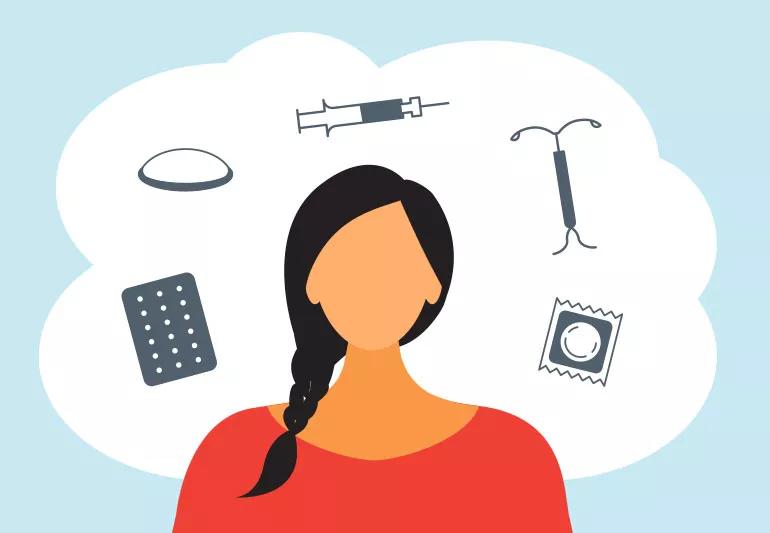There are many highly effective pregnancy prevention methods to choose from

Image content: This image is available to view online.
View image online (https://assets.clevelandclinic.org/transform/e5a685ba-50ad-42da-b5d0-b2844ecdf2dd/wmnBirthControlChoices1-984879236-770x553-1_jpg)
Illustration of woman thinking about different birth control choices
Babies are cute and cuddly, but that doesn’t necessarily mean you want one, at least not right now. Thank goodness for birth control options — there are plenty of effective ways to avoid getting pregnant. In fact, every time you flip through a magazine, it seems there’s another new birth control on the market. So, how can you decide which method is best for you?
Advertisement
Cleveland Clinic is a non-profit academic medical center. Advertising on our site helps support our mission. We do not endorse non-Cleveland Clinic products or services. Policy
“My first question is always, ‘What’s most important to you?’” says Ob/Gyn Ashley Brant, DO. “For one person, the answer is fewer side effects. For another, it’s a less painful period. Those preferences, plus the individual’s medical history, can help guide the decision.”
In deciding what birth control method is right for you, ask yourself questions like:
Advertisement
Once you’ve considered these questions, sort through the various birth control methods to help you determine which one seems right for you (bearing in mind that some of them can be used together for additional protection).
Dr. Brant walks you through some of the most popular birth control options on the market now.
One of the most commonly used birth control methods is “the pill.” Birth control pills regulate your hormones to control your menstrual cycle.
You take three weeks of active pills. During the fourth week, you take placebo pills, which don’t have hormones. That’s when you get your period.
Pros:
Cons:
“The IUD is an excellent birth control option for women who want to take action and not think about it again for a while,” Dr. Brant says. “Your Ob/Gyn inserts a T-shaped device into the uterus during a quick in-office procedure. There are two forms of IUD, a copper version and a plastic version that contains hormones. IUDs work by making it nearly impossible for the sperm to reach the egg.”
Pros:
Cons:
The condom serves as a barrier that prevents sperm from entering your uterus.
Pros:
Advertisement
Cons:
It’s a small plastic rod inserted under the skin of your upper arm to deliver a constant supply of pregnancy-preventing hormones into your bloodstream for three years.
Pros:
Cons:
Your healthcare provider can give you a pregnancy protection shot every three months.
Pros:
Cons:
The ring and patch deliver the same hormones as the pill. You place the patch on your skin and change it every week. The ring is a piece of flexible plastic that you place in your vagina and replace each month. You get your period when you remove the patch and ring for one week out of the month.
Pros:
Advertisement
Cons:
This non-hormonal method of birth control is inserted into your vagina before sex to stop sperm from reaching your eggs. It does this by lowering the pH in your vagina, which makes it more difficult for sperm to move, or by destroying the sperm.
Pros:
Cons:
If you’d prefer not to hear the pitter-patter of little feet anytime soon, talk to your primary care doctor or Ob/Gyn to find the birth control method that’s best for you.
Advertisement

Sign up for our Health Essentials emails for expert guidance on nutrition, fitness, sleep, skin care and more.
Learn more about our editorial process.
Advertisement
The Yuzpe regimen is less effective than other forms of emergency contraceptives, and it’s associated with more side effects
Both are about equally effective when used properly — IUDs are long-lasting and don’t require you to think about them
Birth control medications are more than 99% effective, but only when used properly
Today’s birth control pills don’t usually cause depression — but hormones affect everyone differently
No, you can’t prevent pregnancy by douching after sex, having sex standing up or having sex only at the ‘safe’ time
IUDs can make your period lighter, heavier, irregular or stop it completely
Birth control gel is simple to use and an effective method for preventing pregnancy
The scenarios vary based on how many pills you’ve missed and whether you take a combination pill or progestin-only pill
Although it could be used as a moisturizer, this new trend is not recommended
Communicating clear limits helps protect your time, energy and emotional well-being
High cholesterol can be genetic, but testing and treatment can lower your heart disease risk